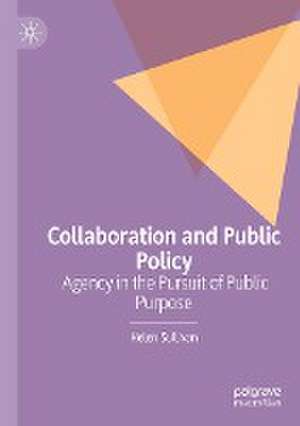Collaboration and Public Policy: Agency in the Pursuit of Public Purpose
Autor Helen Sullivanen Limba Engleză Paperback – 4 oct 2023
| Toate formatele și edițiile | Preț | Express |
|---|---|---|
| Paperback (1) | 637.78 lei 6-8 săpt. | |
| Springer International Publishing – 4 oct 2023 | 637.78 lei 6-8 săpt. | |
| Hardback (1) | 643.16 lei 6-8 săpt. | |
| Springer International Publishing – 3 oct 2022 | 643.16 lei 6-8 săpt. |
Preț: 637.78 lei
Preț vechi: 750.33 lei
-15% Nou
Puncte Express: 957
Preț estimativ în valută:
122.04€ • 127.68$ • 101.38£
122.04€ • 127.68$ • 101.38£
Carte tipărită la comandă
Livrare economică 02-16 aprilie
Preluare comenzi: 021 569.72.76
Specificații
ISBN-13: 9783031095870
ISBN-10: 3031095871
Pagini: 267
Ilustrații: XIX, 267 p. 29 illus., 3 illus. in color.
Dimensiuni: 148 x 210 mm
Greutate: 0.35 kg
Ediția:1st ed. 2022
Editura: Springer International Publishing
Colecția Palgrave Macmillan
Locul publicării:Cham, Switzerland
ISBN-10: 3031095871
Pagini: 267
Ilustrații: XIX, 267 p. 29 illus., 3 illus. in color.
Dimensiuni: 148 x 210 mm
Greutate: 0.35 kg
Ediția:1st ed. 2022
Editura: Springer International Publishing
Colecția Palgrave Macmillan
Locul publicării:Cham, Switzerland
Cuprins
1. Introduction: The collaborative conundrum in public policy.- 2. A framework for analysing collaboration: actors, collaborative domains, and public policy elements.- 3. Ideas, agency, and collaboration.- 4. Rules, agency, and collaboration.- 5. Ethics, agency, and collaboration.- 6. Expertise, agency, and collaboration.- 7. Emotions, agency, and collaboration.- 8. Objects, agency, and collaboration.- 9. Practice, agency, and collaboration.- 10. Conclusion. Prospects and possibilities for public policy collaboration.
Notă biografică
Helen Sullivan is Professor of Public Policy and Dean of the College of Asia and the Pacific at the Australian National University.
Textul de pe ultima copertă
“In this tour de force, Sullivan moves our understanding of collaboration to the next level by examining the interplay among actors, collaborative domains, and public policy elements. Through compelling real-world examples, her ingenious analytical framework comes alive in a way that will inform scholars and practitioners alike. This is a must-read for anyone interested in improving public policy and governance.”
– Rosemary O’Leary, Edwin O. Stene Distinguished Professor, University of Kansas, USA
“In this important text Sullivan masterfully synthesises the expansive collaboration literature and provides a fascinating account of this concept across time and space. While it is often accepted in the literature that collaboration is contingent on the work of humans, this is rarely unpicked. The framework developed in the book provides practical utility in understanding and operationalising collaboration and is well illustrated by relevant case studies.” – Helen Dickinson, Professor of Public Service Research, University of New South Wales Canberra, Australia
“Collaboration will always be with us. This excellent book gives us the theoretical insights to understand why and the empirical breadth to see why it matters.”
– Catherine Needham, Professor of Public Policy and Public Management, University of Birmingham, UK
“Sullivan has produced a tour de force on one of the most fundamental concepts of our times and, in doing so, has built a compelling case for rethinking collaboration from the ground up. The terrain covered in her treatise is without equal.”
– Janine O’Flynn, Professor of Public Management, University of Melbourne and the Australia New Zealand School of Government, Australia
Collaboration is a ubiquitous yet contested feature of contemporary public policy. This book offers a new account of collaboration’s appeal to human actors drawing on empirical examples across time and space. It provides a novel and comprehensive framework for analysing collaboration, that will be of use to those interested in understanding what happens when human actors collaborate for public purpose.
Helen Sullivan is Professor of Public Policy and Dean of the College of Asia and the Pacific at the Australian National University.
– Rosemary O’Leary, Edwin O. Stene Distinguished Professor, University of Kansas, USA
“In this important text Sullivan masterfully synthesises the expansive collaboration literature and provides a fascinating account of this concept across time and space. While it is often accepted in the literature that collaboration is contingent on the work of humans, this is rarely unpicked. The framework developed in the book provides practical utility in understanding and operationalising collaboration and is well illustrated by relevant case studies.” – Helen Dickinson, Professor of Public Service Research, University of New South Wales Canberra, Australia
“Collaboration will always be with us. This excellent book gives us the theoretical insights to understand why and the empirical breadth to see why it matters.”
– Catherine Needham, Professor of Public Policy and Public Management, University of Birmingham, UK
“Sullivan has produced a tour de force on one of the most fundamental concepts of our times and, in doing so, has built a compelling case for rethinking collaboration from the ground up. The terrain covered in her treatise is without equal.”
– Janine O’Flynn, Professor of Public Management, University of Melbourne and the Australia New Zealand School of Government, Australia
Collaboration is a ubiquitous yet contested feature of contemporary public policy. This book offers a new account of collaboration’s appeal to human actors drawing on empirical examples across time and space. It provides a novel and comprehensive framework for analysing collaboration, that will be of use to those interested in understanding what happens when human actors collaborate for public purpose.
Helen Sullivan is Professor of Public Policy and Dean of the College of Asia and the Pacific at the Australian National University.
Caracteristici
Interrogates the concept of collaboration in the context of public policy and management Situates human actors at the centre of analysis, and draws on empirical examples across time and space Provides a novel and comprehensive framework for analysing what happens when human actors collaborate in public policy
